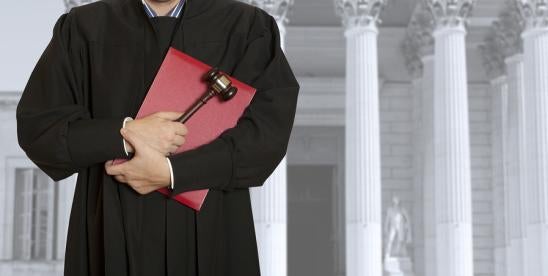Last March, I posed the following question:
But if you were hailed before an unconstitutional tribunal with the ostensible authority to fine you and bar you from working, would you want a “real” court to step in and consider the constitutionality of the proceedings?
At the time, I was disappointed by U.S. District Court Judge Rudolph T. Randa’s ruling in Bebo v. SEC, 2015 U.S. Dist. LEXIS 25660 (E.D. Wis. Mar. 3, 2015). Although Judge Randa found Ms. Bebo’s constitutional challenge to the SEC’s administrative court to be “compelling and meritorious”, he concluded that she must litigate her claims before the SEC and then, if necessary, appeal to the Court of Appeals. Judge Randa’s ruling was affirmed in Bebo v. SEC, 799 F.3d 765 (7th Cir. Wis. 2015). Judge Ronnie Abrams in the Southern District of New York also sided with Judge Randa, Tilton v. SEC, 2015 U.S. Dist. LEXIS 85015 (S.D.N.Y. June 30, 2015), but Judge Richard M. Berman, sitting in the same District, disagreed, Duka v. United States SEC, 2015 U.S. Dist. LEXIS 124444 (S.D.N.Y. Sept. 17, 2015).
I am therefore pleased to learn that a different federal judge understands the basic unfairness of forcing people to endure an unconstitutional hearing. In Ironridge Global IV, Ltd. et al. v. SEC, (U.S. Dist. Ct. Case No. 1:15-CV-2512-LMM (Nov. 17, 2015)), Judge Leigh Martin May ruled that the plaintiffs had “a substantial likelihood of success on the merits of their claim that the SEC has violated the Appointments Clause [U.S. Const. art. II, § 2, cl. 2.]”.
Much could be said about this ruling, but I was most pleased by Judge May’s common-sense understanding:
If Plaintiffs are required to raise their constitutional law claims following the administrative proceeding, they will be forced to endure what they contend is an unconstitutional process. Plaintiffs could raise their constitutional arguments only after going through the process they contend is unconstitutional—and thus being inflicted with the ultimate harm Plaintiffs allege (that is, being forced to litigate in an unconstitutional forum). By that time, Plaintiffs’ claims would be moot and their remedies foreclosed because the courts of appeals cannot enjoin a proceeding which has already occurred.
I’m willing to “bet the farm” that most people would agree that being forced to litigate in an unconstitutional forum is a harm that they should not be forced to endure. You may read Judge May’s ruling here.
Some attentive readers may question whether Judge May’s ruling is consistent with an earlier ruling in which she declined to preliminarily enjoin the SEC, Timbervest, LLC v. SEC, 2015 U.S. Dist. LEXIS 132082 (N.D. Ga. Aug. 4, 2015). In that case, however, the plaintiffs sought to enjoin the SEC from publicizing an ALJ’s decision, not the proceeding itself. As Judge May explained:
Plaintiffs have already gone through the entirety of the administrative procedure before the ALJ—thus, no injunction will cure or prevent Plaintiffs’ prior obligation to defend itself before the ALJ. And any harm which Plaintiffs have already suffered by virtue of the initial decision being published has already been experienced; removing the ALJ’s initial decision from the website would not prevent a future harm.



 i
i

